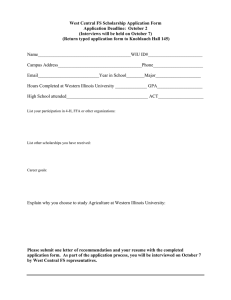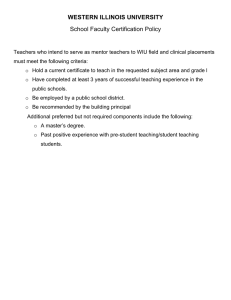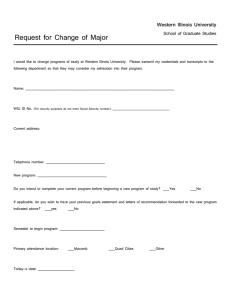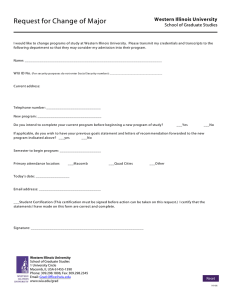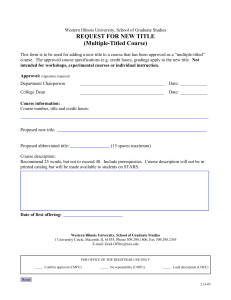Physics with Teacher Certification in Science
advertisement
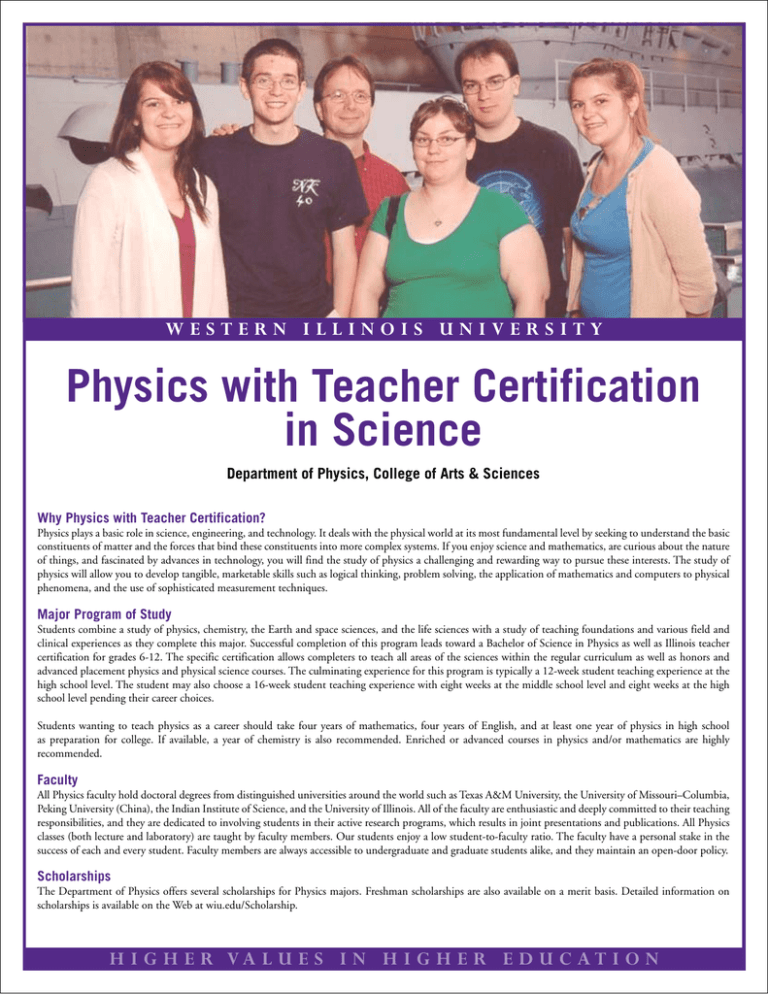
WESTERN ILLINOIS UNIVERSITY Physics with Teacher Certification in Science Department of Physics, College of Arts & Sciences Why Physics with Teacher Certification? Physics plays a basic role in science, engineering, and technology. It deals with the physical world at its most fundamental level by seeking to understand the basic constituents of matter and the forces that bind these constituents into more complex systems. If you enjoy science and mathematics, are curious about the nature of things, and fascinated by advances in technology, you will find the study of physics a challenging and rewarding way to pursue these interests. The study of physics will allow you to develop tangible, marketable skills such as logical thinking, problem solving, the application of mathematics and computers to physical phenomena, and the use of sophisticated measurement techniques. Major Program of Study Students combine a study of physics, chemistry, the Earth and space sciences, and the life sciences with a study of teaching foundations and various field and clinical experiences as they complete this major. Successful completion of this program leads toward a Bachelor of Science in Physics as well as Illinois teacher certification for grades 6-12. The specific certification allows completers to teach all areas of the sciences within the regular curriculum as well as honors and advanced placement physics and physical science courses. The culminating experience for this program is typically a 12-week student teaching experience at the high school level. The student may also choose a 16-week student teaching experience with eight weeks at the middle school level and eight weeks at the high school level pending their career choices. Students wanting to teach physics as a career should take four years of mathematics, four years of English, and at least one year of physics in high school as preparation for college. If available, a year of chemistry is also recommended. Enriched or advanced courses in physics and/or mathematics are highly recommended. Faculty All Physics faculty hold doctoral degrees from distinguished universities around the world such as Texas A&M University, the University of Missouri–Columbia, Peking University (China), the Indian Institute of Science, and the University of Illinois. All of the faculty are enthusiastic and deeply committed to their teaching responsibilities, and they are dedicated to involving students in their active research programs, which results in joint presentations and publications. All Physics classes (both lecture and laboratory) are taught by faculty members. Our students enjoy a low student-to-faculty ratio. The faculty have a personal stake in the success of each and every student. Faculty members are always accessible to undergraduate and graduate students alike, and they maintain an open-door policy. Scholarships The Department of Physics offers several scholarships for Physics majors. Freshman scholarships are also available on a merit basis. Detailed information on scholarships is available on the Web at wiu.edu/Scholarship. H I G H E R VA L U E S I N H I G H E R E D U C A T I O N WESTERN ILLINOIS UNIVERSITY Physics at Western The Department of Physics at Western Illinois University is committed to offering every undergraduate and graduate student the opportunity to fully realize his or her potential in an environment dedicated to excellence. The department has a history of teaching excellence and a tradition of involving its students in the excitement and challenges of physics research. The department offers four-year programs in Physics and Physics Teacher Certification, a minor in Physics, and various pre-professional programs: a 2+2 Pre-Engineering program, a 3+2 dual degree in Engineering Physics and Engineering, and a 1+3 PreArchitecture program. The department also offers a Master of Science degree in Physics. Research Opportunities The Department of Physics has research programs that span from very applied to very fundamental problems in experimental and theoretical physics. Current active areas of research in the department are in Experimental Condensed Matter Physics, Experimental and Theoretical Atomic-Molecular-Optical Physics, NanoScale Materials, and Astrophysics. Physics faculty are very committed to providing exciting and unique research opportunities for both undergraduates and graduates and to work with them on a one-on-one basis. Physics majors regularly present their results at University, regional, and national student research conferences. Students who carry out original research projects develop critical thinking skills and learn how to work independently as well as in teams. These are precisely the qualities that employers and graduate schools are looking for in applicants, and our majors have been very successful in securing good jobs after graduation or in continuing their education at prestigious graduate programs in engineering as well as in physics. They also often win prestigious national fellowships in their junior or senior years. Student Activities Physics students in the teacher certification program participate in a number of activities through their program, including judging science fairs, coordinating events for Science Olympiad, and attending the WIU Secondary Science Education Conference as well as assisting with the annual Chemistry and Physics Show. They are also strongly encouraged to participate in professional organizations such as the Illinois Science Teachers Association, National Science Teachers Association, the Illinois Association for Physics Teachers, and the American Association for Physics Teachers. In addition, students may participate in the Society of Physics Students, an association affiliated with the National Physics Honors Society. Also, a wide variety of student activities and organizations are available to all Western students. Learn more at http://osa.wiu.edu. After College Middle and high school teachers are in great demand. Science teachers are a Designated Teacher Shortage Area in the State of Illinois (www.isbe.net/research/ htmls/teacher_shortage.htm) as they are in many states. Teachers with an expertise in physics are in particularly high demand. The demand for highly qualified science teachers is anticipated to increase by 15% or more (America’s Career InfoNet) by the year 2016. For Your General Outlook Students seeking to certify for secondary teaching take the University Physics sequence during their first two years, which provides them with a combined theoretical and experimental introduction to all of the basic areas of physics. During their third and fourth years, they take laboratory courses in electronics and modern physics and additional upper-division Physics courses of their choice. These students are expected to take courses that prepare them in chemistry, biology, and geology as well. For More Information The department welcomes visitors. Call the Department of Physics at (309) 298-1596 or e-mail the adviser: LM-Barden@wiu.edu. You can also learn more about the department by visiting wiu.edu/physics. wiu.edu/physics Department of Physics Printed by authority of the State of Illinois 50 • 7/2009 • Y0O9Y Currens Hall 212 • Western Illinois University 1 University Circle • Macomb, IL 61455-1390 Phone: (309) 298-1596 Academic Excellence • Educational Opportunity • Personal Growth • Social Responsibility
